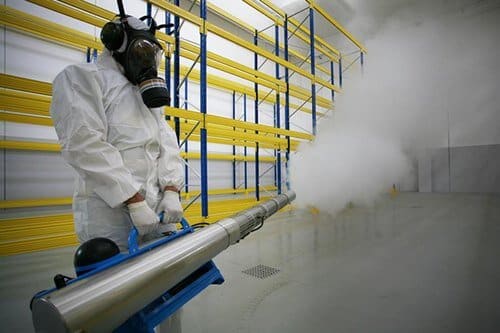Southern California Exterminators
Fumigation vs Local Termite Treatments
Which is Best for Drywood Termite Infestations?

- High efficacy: Whole-structure fumigation is the most effective way to eliminate all termites in a structure, including hidden infestations.
- Broad-spectrum efficacy: Fumigants kill many pests, including termites, bed bugs, cockroaches, and rodents.
- Long-lasting protection: Fumigation can provide long-lasting protection against termites, depending on the type of fumigant used and the structure’s condition.
- Thorough treatment: Fumigants penetrate all areas of a structure, including wood, insulation, and voids. This ensures that all termites are killed, even hidden or challenging to reach.
- Less expensive: Local termite treatments are typically less costly than whole-structure fumigation.
- Less disruptive: Local termite treatments do not require homeowners to vacate their homes for several days.
- More convenient: Local termite treatments can be done more quickly than whole-structure fumigation.
- Fumigation is a highly regulated process and must be performed by a licensed pest control professional.
- Fumigation can be disruptive, as homeowners must vacate their homes for several days.
- Fumigation can kill plants and animals, so removing them from the house before fumigation is important.
- Local termite treatments can be effective, but they may require multiple applications.
- Local termite treatments may not be effective against hidden termite infestations.
Does Homeowners Insurance Cover Termite Damage?
Insurance providers generally do not cover the expenses related to termite damage and removal under standard home, condo, or renters’ insurance policies. These companies view termite infestations as preventable, placing the responsibility and cost on the property owner. Thus, individuals should be prepared to bear the financial burden of addressing termite issues. Find out if homeowners insurance covers termite
damage in Orange County and what you can do to prevent and treat it. (800)-418-9263
Why homeowners’ insurance usually excludes coverage for termite damage in Orange County, CA
Does Homeowners Insurance Cover Termite Damage in Huntington Beach? Like homeowners’ insurance, renters insurance typically only covers sudden and direct losses caused by a covered peril. This means that termite damage is usually not covered by renters’ insurance. If you suspect that your rented property has termites, it is essential to promptly notify your landlord so they can arrange for a professional exterminator to address the issue.
- Maintain a two to three-foot distance between plants, mulch, and your home’s foundation. This prevents easy access for termites.
- Ensure that storm drains empty at least a few feet from your home’s foundation. This prevents moisture accumulation, which attracts termites.
- Repair any leaks in faucets, roofs, and gutters promptly. Damp areas are desirable to termites.
- When termites start swarming in the winter, turn off outdoor lights as these insects attract light sources.
- Schedule a professional pest inspection with a certified inspector, even if you believe your home is termite-free. Prevention is always better than dealing with an infestation.
- Avoid storing firewood close to your house. Termites are attracted to wood, and having firewood nearby creates an easy entry point.
- Choose treated wood for all construction projects, including your home, deck, and fences. Treated wood is less appealing to termites and helps prevent infestations.
Discover additional information regarding the coverage provided by homeowners insurance coverages.
